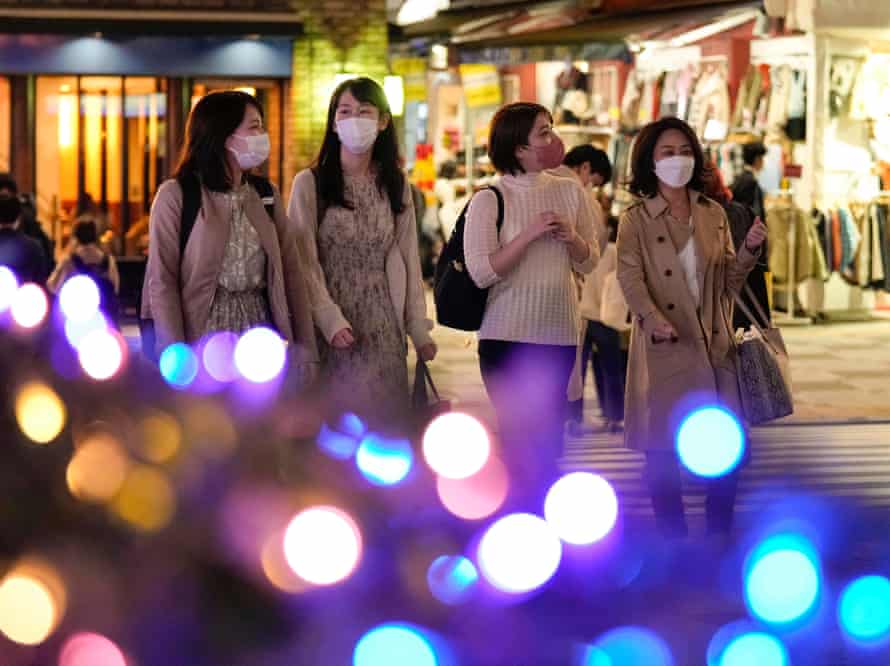Early this year, as Japan’s coronavirus cases began another ominous rise, the country seemed determined to confirm its reputation as a vaccine backwater.
Held up by additional clinical trials, its Covid-19 vaccine rollout lagged behind that of the UK and other countries by several months. And when it finally started offering shots in February, doses were administered at an achingly slow pace, beginning with medical staff and older people. Tens of millions of others were convinced they would have to wait many months before coming within arm’s reach of a health worker’s needle.
But today, Japan ranks among the most Covid-immunised countries in the world. As of Friday, more than 94.5 million people, or almost three-quarters of its 125 million population, had received both jabs – a higher rate than the UK and several other countries that began their rollouts much earlier.
Daily Covid-19 cases have plummeted. On Saturday, 202 new infections were reported nationwide, compared with more than 25,000 just three months ago. Tokyo had 24 cases, compared with a record 15,773 on 13 August, days after the closing ceremony of the 2020 Olympics.
Months of emergency measures, including a ban on alcohol sales at restaurants and bars, have been lifted and people are returning to sports and other events in significant numbers. Booster shots will be offered from next month, starting with medical workers.
Media hype over scares involving the measles, mumps and rubella (MMR) vaccine in the 1990s and, more recently, with the human papillomavirus (HPV) vaccine, helped turn Japan into one of the least vaccine-confident countries in the world, according to a 2020 Lancet study.
Less than 30% of people were confident that vaccines were safe, compared with at least 50% of Americans, the study said. A February poll by the Kyodo news agency found that 27.4% of respondents said they did not want to be vaccinated against Covid-19.
But data provided by the prime minister’s office shows high Covid-19 vaccination rates across all age groups. More than 92% of people in their 70s have been double jabbed, along with almost 70% of those in their 30s.

Most surprising, however, is the take-up among younger people, a cohort thought to be more influenced by anti-vax conspiracies and social media disinformation. The most recent data show that 5.4 million children aged 12-19 – or 60.7% of that age group – have received two doses.
Nanako Tokunaga, a university student in Tokyo, was initially sceptical when pharmaceutical companies announced they had developed Covid-19 vaccines at the end of last year.
“I was worried about the side effects, and there were lots of rumours on social media that they caused infertility,” said Tokunaga, 20.
Reassured by pro-vaccination comments by politicians and doctors, Tokunaga received both jabs in August. Many of her friends have done the same since early summer, when TV broadcasts showed long queues outside a walk-in vaccination centre in Shibuya, a Tokyo neighbourhood popular with young people. “It made us think seriously about the benefits of having the vaccine,” she said. “I’m happy that I decided to go ahead with it.”
Japan’s complicated relationship with vaccines can be traced to successful class-action lawsuits brought against the health ministry by a small number of parents who claimed – without presenting evidence of a causal link – their children had experienced serious side-effects from the MMR vaccine in the 1990s.
But Prof Kentaro Iwata, the head of the infectious diseases division at Kobe University hospital, said it was wrong to characterise Japanese people as fundamentally vaccine hesitant, noting the high take-up rate of the flu vaccine.
“Japanese bureaucrats are quite hesitant when it comes to advocating vaccines, however, particularly after the government lost lawsuits regarding side effects from the MMR vaccine,” he said.
Iwata has been critical of the government’s handling of the pandemic, but praised its approach to inoculations. “The Covid vaccination programme has been a great success,” he said. “I have never seen something implemented this pragmatically in the history of vaccinations in Japan.”
Initially, however, even government politicians and health experts were cautious about encouraging people to have the Covid jab. The turning point came in the summer, as Tokyo was preparing to host the 2020 Olympics in defiance of public opinion.
“The government was insisting that the Olympics would go ahead, and that made people fearful,” said Riko Muranaka, a lecturer at Kyoto University Graduate School of Medicine. “Japan wouldn’t be in the good position it is in now had it not been for the Olympics.

“There was also an element of ‘negativity’ in spurring people to get vaccinated. People decided they should have the vaccine so they could tell other people that they were not a threat. It was a social courtesy, and to protect themselves, of course.”
The shift in attitudes is not limited to the Covid-19 vaccine. A panel on Friday said the health ministry should resume actively recommending the HPV vaccine – which is universally recognised as safe and effective – to teenage girls. Japan withdrew the recommendation – but kept the vaccine available free of charge – in 2013 after sensationalist media reports of alleged severe side-effects.
Although no causal link between the vaccine and side-effects was established, the rate of HPV inoculation fell from 70% in 2013 to less than 1%.
Hinako Sakikawa, a 19-year-old university student, said she initially shared her age group’s scepticism of the Covid-19 vaccine. “It was new, so I was anxious at first,” she said. “I thought it might damage my health or even threaten my life.”
Sakikawa, who said she and almost all of her initially vaccine-hesitant friends were now fully jabbed, acknowledged that peer pressure had influenced their decision.
“There was definitely a feeling that we should have the vaccine, since everyone else seemed to be having it, and we promised we would meet up once we were double jabbed. Now it’s easier to go out and meet friends and do the all the things we couldn’t do before.”
Stay connected with us on social media platform for instant update click here to join our Twitter, & Facebook
We are now on Telegram. Click here to join our channel (@TechiUpdate) and stay updated with the latest Technology headlines.
For all the latest Covid-19 News Click Here
